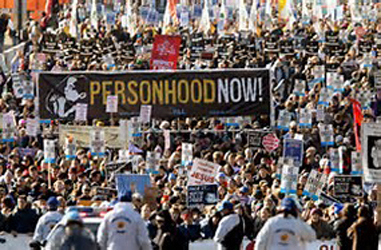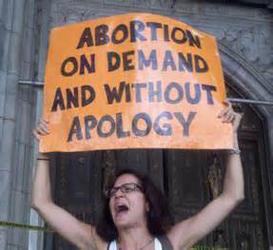“A Piece of My Mind”
February 2015 Newsletter from Donald Shoemaker
Advancing Christian Faith and Values, Defending Religious Liberty for All, Supporting Civility and the Common Good through Preaching, Teaching, Writing, Activism and Reasoned Conversations
Thoughts on the Ethics of Abortion 42 Years after Roe v. Wade (January 22, 1973)


When they were living, my aunt and uncle resided in a fine California retirement community. During a visit with them, I was taken by my uncle on a tour of the community’s nearly completed state-of-the-art facility for Alzheimer patients.
We looked inside one room that would soon house a patient. There was no mirror in the bathroom for there was no need for a mirror. The patient who would eventually stay there would not know who he or she is.
Relatives of the patients would be able to visit with them in a comfortable sitting area. But there would be no depth of communication, for the Alzheimer patient eventually has no capacity for an “I-Thou” relationship.
As this disease takes its toll, connection with the past and present is lost. All sense of futurity is gone.
When my uncle and I tried to leave we discovered we had a problem! There was no way to open the facility’s door from the inside without knowing a special code. This is needed because Alzheimer patients no longer have a sense of “here” or “there” and must be protected in their movements lest they wander aimlessly and into danger. We located a construction worker who let us out.
The best of care will be provided for these dependent patients. And so it should be, for the spark of human dignity remains in them. As Christian teaching would affirm, they yet retain, in spite of their physical brokenness, the Image of God.
Since my visit to that care facility I have often thought of the issue of “personhood” and how a debate on human personhood and abortion has raged for five decades since permissive abortion laws were first put on the books in the 1960’s. Originally designed for “those truly tough cases,” the laws triggered an abortion avalanche and were themselves swept away by the U.S. Supreme Court’s Roe v. Wade decision in January 1973.
“Right to Life” advocates have argued for a biological understanding of personhood. Human life, it is said, begins at conception and ought to be respected and protected from violent assault from then until natural death.
Personhood is tied to the biological fact of being human, one of “us” rather than an “it” or one of “them.” Right to Life advocates have argued for the full personhood of unborn humans or at least that enough claim to personhood exists for the life of the unborn to be worthy of protection.
Others have seen personhood as a developing value throughout the prenatal state. In this case, our unborn have a greater and greater claim to life and protection and any termination of their existence requires increasing grounds for justification the longer they exist in utero. As a result, these people join with the “Right to Life” advocates in wanting to ban late-term abortions.
Defenders of permissive abortion laws, of course, do not see matters that way. Personhood is connected to socializing capabilities, or perhaps to intellectual capacities (or these defenders may simply ignore the personhood issue).
Philosopher Mary Ann Warren argued that there are five traits central to the concept of personhood which we can summarize as (1) consciousness, (2) reasoning, (3) self-motivated activity, (4) the capacity to communicate and (5) the presence of self-concepts and self-awareness. Not all of these need be present for a “person” to exist, but a measure of them must exist and a being that lacks all of them is certainly not a “person” in a moral sense.
Medical ethicist Joseph Fletcher (who popularized “Situation Ethics”) had a long list of personhood criteria, including self awareness, time consciousness, a sense of futurity, a sense of the past, the capability of relating to others, communication and control of existence.
Criteria like these clearly exclude the unborn from the realm of “persons.” Thinking this way, one can rationalize abortion as an acceptable practice secured, as the Court saw it, by a “right to privacy” to be found in the “penumbra” of the U.S. Constitution.
What may surprise others but which should not escape the notice of rationalizers like these is that post-partum infants aren’t “persons” by this standard either. Nor are the comatose and others who lack self-awareness and self-control. Infants lack a moral claim to personhood and therefore are disposable, although we may value them for their potential and charm or for other utilitarian reasons. (One medical ethicist used the term “proximate persons” for infants ages 0-2 years.)
At the extreme edge of the scientific and ethical horizon, a justification could be made for cloning human life and harvesting body parts to serve the rest of us who have successfully achieved our personhood, at least in the eyes of those who control things.
Which brings me full circle to the excellent care facility for Alzheimer patients. By the thinking that has prevailed to give us abortion, these patients are not persons. Unlike the unborn, their futurity and their social and intellectual potential are gone. As their disease has progressed, they have gradually but surely lost all claim to the care and love and protection personhood would afford.
In Roe v. Wade, the court threw up its hands and professed agnosticism on the issue of when personhood begins. Incredibly, it then proceeded to adopt a particular view of personhood (you have value at birth) and imposed a model of prenatal “trimesters” and a permissive latitude that, in effect, have given us abortion on demand. The court never allowed the open public debate and legislative deliberation on this issue that is appropriate in a democratic society.
When the Supreme Court ruled on doctor-assisted suicide in 1997, this practice did not receive the constitutional “green light” its advocates had hoped for. One might have expected the court to declare a right to assisted suicide on the same “right to privacy” grounds that gave us abortion on demand. But the court saw the need to guarantee “an earnest and profound debate about the morality, legality and practicality of physician-assisted suicide [that should take place] in a democratic society.”
That statement may have been the closest thing we will hear from the court that sounds like an apology for Roe v. Wade. Rather than resolving the great debate over abortion rights, Roe v. Wade fueled the most acrimonious polarization of our time which shows no signs of abating now forty-two years later.
(This essay is a revision of an opinion column published in the Long Beach Press-Telegram in 1998.)
Bible Insight
Sticks and Stones
May Break My Bones,
But Words Can REALLY Hurt Me!

If you want a month of really profitable Bible reading, take the month of March to read daily one of the 31 chapters in the Bible’s “Book of Proverbs”.
What is the Book of Proverbs? It’s a collection of moral principles on many common issues that help us navigate ethically and honorably in a difficult, sometimes unfair world. Even more, I believe it is a collection God endorses and wants us to know to be wise. One of the key themes of Proverbs is speech—what’s good and not so good. What do we say that either brings help, healing and integrity to a situation or brings bitterness, strife and injustice?
Here are some of the speech counsels we get from Proverbs. After each statement, I give the chapter and verse in Proverbs where you can find it.
- Gossip and Slander
- A perverse person stirs up conflict,
and a gossip separates close friends. (16:28) - A gossip betrays a confidence,
but a trustworthy person keeps a secret. (11:13) - Whoever conceals hatred with lying lips
and spreads slander is a fool. (10:18)
- Contentious Words that stir up trouble
- As charcoal to embers and as wood to fire,
so is a quarrelsome person for kindling strife. (26:21) - Starting a quarrel is like breaching a dam;
so drop the matter before a dispute breaks out. (17:14)
- Truth and Lies
- The Lord detests lying lips,
but he delights in people who are trustworthy. (12:22) - A fortune made by a lying tongue
is a fleeting vapor and a deadly snare. (21:6)
- Too Much Talking, Period!
- When words are many, sin is not absent
But he who holds his tongue is wise. (10:19) - Do you see someone who speaks in haste?
There is more hope for a fool than for him. (29:20) - Those who guard their mouths and their tongues
keep themselves from calamity. (21:23) - The one who has knowledge uses words with restraint,
and whoever has understanding is even-tempered. (17:27) - The words of the reckless pierce like swords,
but the tongue of the wise brings healing. (12:18)
- Gracious and gentle words
- Gracious words are a honeycomb,
sweet to the soul and healing to the bones. (16:24) - A gentle answer turns away wrath,
but a harsh word stirs up anger. (15:1)
The Bible says our tongues, though small among our bodies’ members, are the hardest part of the body to control (James 3:1-12). With it we bless God one moment and the next moment turn around and curse our neighbor. With encouragement, prayer, Bible reading and God’s grace and power, let’s learn to control the tongue more and more.
Don’s Upcoming Ministries

February 18 – Lead “Ash Wednesday” service at Grace Community Church of Seal Beach (7 PM)
March 22 – Speak in Sunday Morning Worship Services at Grace Community Church of Seal Beach (8:00, 9:30, 11:00)
What Our President Should Tell Raul Castro
[Published in the Long Beach Press-Telegram on Dec. 30, 2014]
Cuban President Raul Castro has made it clear that diplomatic relations with the United States will mean no change in his country’s Communist structure, speaking as if the two political systems are moral equivalents and equally embraced by the people.
Now is the time for President Obama to lead with his words in the tradition of John F. Kennedy, who at the Berlin Wall compared democratic rule to East German Communism. “Freedom has many difficulties and democracy is not perfect, but we have never had to put a wall up to keep our people in.”
Here’s a text for our president. “America is not perfect in its democracy. But it is good and its democratic ideals are deeply imbedded in our nation’s soul. It is a government of the people and by the people. The Cuban people on the other hand have not lived as free people. They know nothing about free elections and little about a free economy. Our two governments are not moral equivalents.
“Someday soon the Cuban people should be allowed to freely choose its leaders and the systems it wants, and its rulers should abide by the will of the people. We do not seek to impose change, but we will strongly speak for change and we look forward to the day when the Cuban people will be truly free.”
– Donald P. Shoemaker
Appendix – Richard Nixon on Relations with Cuba
Richard Nixon’s last book, Beyond Peace, was published by Random House in 1994, the year of his death. In it, Nixon looked at the world through the prism of total realism and pragmatism found in his views on international affairs.
Here are his words about Cuba and the United States (pages 137-38):
In the case of Cuba, much of the pressure to keep our economic embargoes in force derives from the long-standing belief, particularly among many in the Cuban exile community, that this is the best way to bring a swift end to the cruel and destructive Castro regime. It is true that the collapse of the Soviet government and the subsequent cutoff of Soviet economic subsidies have put heavy new pressures on Castro. The privation is brutal. Economic conditions on the island, bad before, have become far worse. His police state has nevertheless maintained its iron grip.
The plain fact, painful though it may be to face, is that after thirty-five years of Castro’s rule, the hard line against him has failed to get rid of him. It is time to shift the central focus of our policies from hurting Cuba’s government to helping its people. It is unlikely that Castro, an isolated survivor of the Soviet world, could again mount a serious subversive threat in this hemisphere, even if Cuba’s economy improves. Meanwhile, the condition of his people is desperate and growing worse. They need food, they need the basic essentials of everyday life, they need the rudiments of a functioning economy, and they need freedom.
The unique nature of the relationship between the United States and Cuba gives us a special responsibility toward its people. As long as it seemed reasonable that severe economic pressures would help them overthrow the Castro dictatorship, it was appropriate to maintain those pressures. As long as Castro was part of a global network of communist aggressors, the embargo strengthened international security. But that network has vanished, and our best service to the Cuban people now would be to build pressure from within by actively stimulating Cuba’s contacts with the free world. What has worked in China now has the best chance of working in Cuba.
This means we should drop the economic embargo and open the way to trade, investment, and economic interaction, while insisting that ideas and information be allowed to flow as freely as goods. Today’s global economy is essentially a market economy. Where the market system penetrates, it carries along the seeds of political and economic reform. We should put the challenge squarely to Castro: If he wants his people to prosper, then let him open the door to goods and ideas. If he insists on keeping it shut, it will be clear beyond question that only his fear of freedom stands in the way of his people’s escape from privation. If he opens it, then he opens it also to the winds of freedom.



